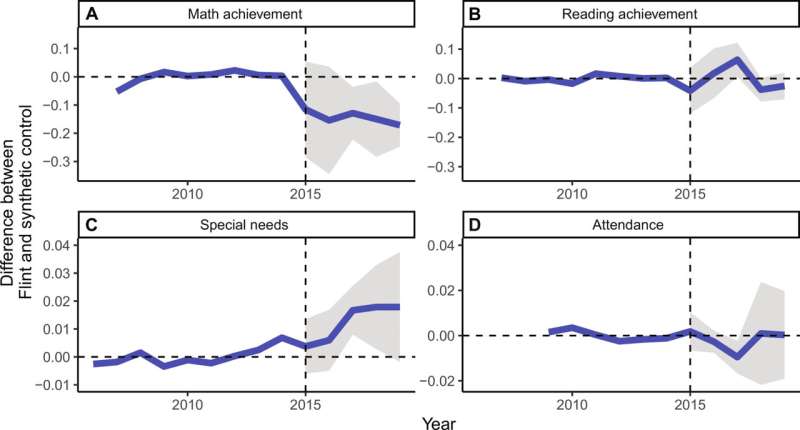March 14, 2024 report
This article has been reviewed according to Science X's editorial process and policies. Editors have highlighted the following attributes while ensuring the content's credibility:
fact-checked
peer-reviewed publication
trusted source
proofread
Study finds children in Flint experienced educational declines even if they did not have lead pipes

A trio of researchers, one a sociologist at Princeton University, the other two public policy experts with the University of Michigan, has found that children living in Flint, Michigan, experienced educational declines after that city changed its water delivery system in 2015, regardless of whether they lived in homes with lead pipe delivery systems.
In their study, reported in the journal Science Advances, Sam Trejo, Gloria Yeomans-Maldonado and Brian Jacob compared education scores with possible lead exposure over a 13-year period covering the time before the switch-over and the time after.
Prior research has shown that consuming small amounts of lead can lead to nerve damage, resulting in cognitive problems, especially in children. Consumption of lead by children has become an issue in the U.S. over the past several decades as aging lead water pipes have resulted in learning and developmental problems. In this new effort, the researchers took another look at the impact on children living in Flint after city officials chose to switch to a new water source.
Prior to 2014, drinking water for Flint residents was pulled from Lake Huron and the Detroit River. That year, in a cost-cutting measure, officials switched to water from the Flint River. Unfortunately, the water in the Flint River was more acidic and leached lead from older pipes, which was consumed by residents.
Prior research has shown that children in the city began experiencing educational declines shortly thereafter, particularly in math. In this new effort, the research team compared educational outcomes for children in the area who did not drink water from the impacted pipes with those who did.
The researchers found nearly equal educational declines in children who did not drink lead-contaminated water compared to those who did. They note that the children had not been tested for lead levels; thus, it is not known if they ingested it from other sources, such as at school. But they also note that they might have been experiencing psychosocial effects related to the water crisis in Flint. They suggest that researchers studying a health crisis like the one in Flint look at both the physical and emotional impacts of such events on child residents.
More information: Sam Trejo et al, The Effects of the Flint water crisis on the educational outcomes of school-age children, Science Advances (2024). DOI: 10.1126/sciadv.adk4737
Journal information: Science Advances
© 2024 Science X Network



















